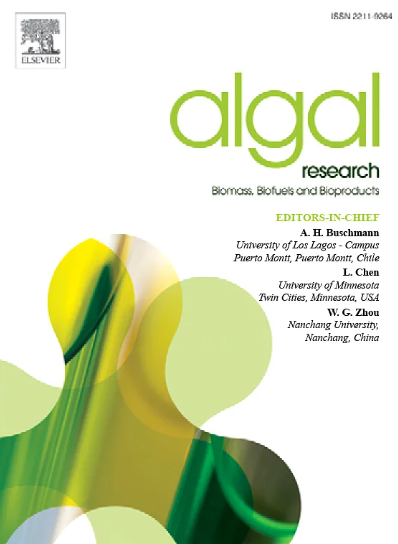Stressing cyanobacteria for enhanced production of bulk and value-added chemicals
IF 4.6
2区 生物学
Q1 BIOTECHNOLOGY & APPLIED MICROBIOLOGY
Algal Research-Biomass Biofuels and Bioproducts
Pub Date : 2025-05-12
DOI:10.1016/j.algal.2025.104095
引用次数: 0
Abstract
Cyanobacteria, ancient photosynthetic prokaryotes capable of directly converting CO₂ and solar energy into various chemicals through photosynthesis, have drawn great attention as a photosynthetic biomanufacturing platform. To enhance the production of various chemicals, multi-dimensional engineering strategies spanning genetic modification to process optimization have been developed. Notably, stress activation strategies, characterized by their strong controllability and the absence of transgenic risks, have recently attracted significant attention. These strategies could reprogram native metabolic networks, effectively redirecting photosynthetic flux toward targeted biosynthesis pathways while maintaining cellular viability, thereby boosting the production of both bulk and value-added chemicals. This review summarizes recent advances in stress-driven cyanobacterial chemical production, including compatible solutes, pigments and biofuels. We dissect regulatory mechanisms at transcriptional, translational, and enzymatic levels, and discuss challenges and potential strategies for enhancing the large-scale industrial production of cyanobacteria under stress conditions.
强调蓝藻以提高散装和增值化学品的生产
蓝藻是一种古老的光合原核生物,能够通过光合作用将二氧化碳和太阳能直接转化为各种化学物质,作为光合生物制造平台而备受关注。为了提高各种化学品的产量,从基因改造到工艺优化的多维工程策略已经被开发出来。值得注意的是,胁迫激活策略以其可控性强、无转基因风险的特点,近年来备受关注。这些策略可以重新编程天然代谢网络,有效地将光合通量转向目标生物合成途径,同时保持细胞活力,从而促进大宗和增值化学品的生产。本文综述了应力驱动蓝藻化学生产的最新进展,包括相容溶质、色素和生物燃料。我们剖析了转录、翻译和酶水平的调控机制,并讨论了在应激条件下提高蓝藻大规模工业生产的挑战和潜在策略。
本文章由计算机程序翻译,如有差异,请以英文原文为准。
求助全文
约1分钟内获得全文
求助全文
来源期刊

Algal Research-Biomass Biofuels and Bioproducts
BIOTECHNOLOGY & APPLIED MICROBIOLOGY-
CiteScore
9.40
自引率
7.80%
发文量
332
期刊介绍:
Algal Research is an international phycology journal covering all areas of emerging technologies in algae biology, biomass production, cultivation, harvesting, extraction, bioproducts, biorefinery, engineering, and econometrics. Algae is defined to include cyanobacteria, microalgae, and protists and symbionts of interest in biotechnology. The journal publishes original research and reviews for the following scope: algal biology, including but not exclusive to: phylogeny, biodiversity, molecular traits, metabolic regulation, and genetic engineering, algal cultivation, e.g. phototrophic systems, heterotrophic systems, and mixotrophic systems, algal harvesting and extraction systems, biotechnology to convert algal biomass and components into biofuels and bioproducts, e.g., nutraceuticals, pharmaceuticals, animal feed, plastics, etc. algal products and their economic assessment
 求助内容:
求助内容: 应助结果提醒方式:
应助结果提醒方式:


